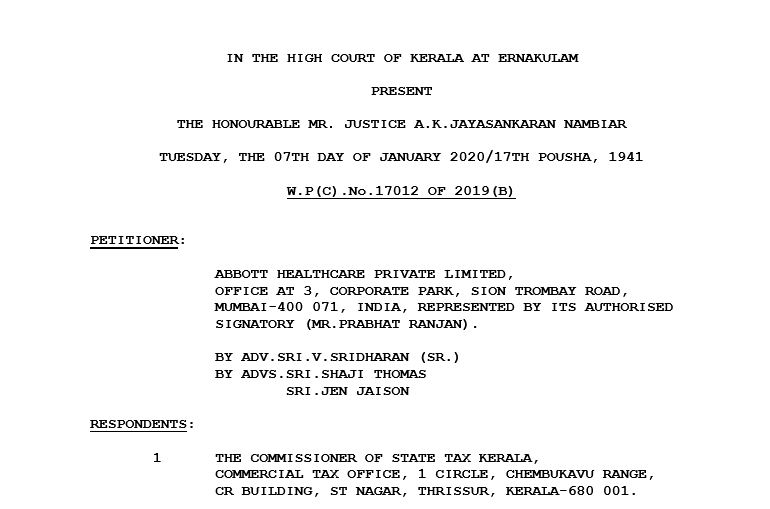AAR and AAAR can decide upon a question not asked?
Case Covered:
ABBOTT HEALTHCARE PRIVATE LIMITED
Versus
THE COMMISSIONER OF STATE TAX KERALA
Facts of the case:
The petitioner herein is a company incorporated under the Companies Act, 1956, having its registered office in Mumbai. It is engaged inter alia in the sale of pharmaceutical products, diagnostic kits, etc. and it is registered under the Goods and
Services Tax Act in the State of Kerala. It is the case of the petitioner in the writ petition that as per the business model operated by it in the State of Kerala, it places its diagnostic instruments at the premises of unrelated hospitals, laboratories, etc. for their use for a specified period without any consideration. The petitioner also enters into Reagent Supply and Instrument Use Agreements with various hospitals, laboratories, etc, whereunder, the arrangement between the parties is for the supply of medical instruments to the hospital/laboratory concerned, for their use, without any consideration for a specified period and for the supply of specified quantities of reagents, calibrators, disposables, etc. at the prices specified in the agreement, through its distributors on payment of applicable GST. It is stated that, as per the agreement, while the supply of instruments is by the petitioner, the supply of reagents, calibrators, and disposables are effected by its distributor, who purchases the said products from the petitioner on principal to principal basis. When the distributor supplies the reagents, calibrators, and disposables to the hospitals/laboratories concerned, the distributor discharges the applicable GST on the price charged for the supply of the said products. In other words, there is no direct sale/supply of the reagents, calibrators, and disposables by the petitioner to the hospitals/laboratories in question. It is also stated that the value of instruments placed at the premises of the hospitals/laboratories compared to the total turnover of supply of reagents, calibrators and disposables by the distributor over the contract period is small and would only be around 20% of the turnover of supply of reagents, calibrators etc. The agreement entered into between the parties also contains a clause which provides that if the hospital fails to purchase specified minimum quantum of reagents, calibrators, etc., then the petitioner is entitled to recover from the hospital an amount equal to the deficit in the actual purchases, vis-a-vis, the minimum purchase stipulated under the contract.
Observations of the court:
On a consideration of the facts and circumstances of the case and the reasonings of the AAR and the Appellate Authority, it is my view that while it may have been open to the AAR to enquire, based on the terms of the agreement, whether the supply of the medical instruments to the customer, although styled as a free supply, was in fact one for valid consideration, its findings as regards a composite supply are wholly without jurisdiction. It is apparent that the AAR went beyond the terms of reference in embarking upon an enquiry as to whether the supplies effected under the agreement between the petitioner and the customer hospitals/laboratories, constituted a composite supply. As a consequence, the AAR did not go into the real issue of whether the supply of instruments per se constituted a taxable supply under the CGST Act. While these facts would have sufficed for this Court to remit the matter to the AAR for a fresh consideration of the issue, the learned senior counsel would urge me to give a definite view on the correctness of the finding of the AAR regarding the transaction being a composite supply. It is therefore that I deem it appropriate to offer my view on the said finding of the AAR, while relegating the matter back to the AAR for a fresh consideration of the query referred to it, for its clarification.
Judgement of the court:
In my view, a finding as regards composite supply must take into account supplies as effected at a given point in time on “as is where is” basis. In particular instances where the same taxable person effects a continuous supply of services
coupled with periodic supplies of goods/services to be used in conjunction therewith, one could possibly view the periodic supply of goods/services as composite supplies along with the service that is continuously supplied over a period
of time. These, however, are matters that will have to be decided based on the facts in a given case and not in the abstract as was done by the AAR. I therefore allow the writ petition, by quashing Exts.P1 and P2 orders, and remit the matter back to the AAR for a fresh decision on the query raised before it by the petitioner company.
The AAR shall pass fresh orders in the matter, based on the observations in this judgment, and after hearing the petitioner, within a period of six weeks from the date of receipt of a copy of this judgment.
The writ petition is disposed as above.
Download the copy:
If you already have a premium membership, Sign In.
 ConsultEase Administrator
ConsultEase Administrator
Consultant
Faridabad, India
As a Consultease Administrator, I'm responsible for the smooth administration of our portal. Reach out to me in case you need help.












